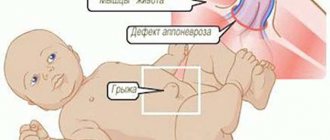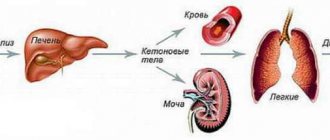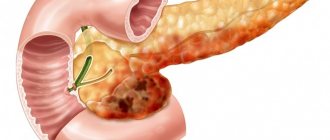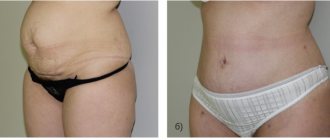Bloating in a child: causes of the condition and treatment measures
Have you encountered a situation where a seemingly healthy and happy child suddenly starts crying?
As soon as the mother gets distracted for a minute or gets ready to get some sleep, she’s already running towards the child, tripping over a cat or the corner of the sofa along the way, and the awakened household grumbles... This is probably a familiar picture for many. Why is the baby crying? This question worries absolutely all mothers in the world. If you survey parents, 80% of them will note the child’s anxiety at an early age [1]. One of the most common causes of crying in children in the first months of life is indigestion, which can manifest itself as regurgitation, constipation and, very often, bloating.
Why might a child experience bloating?
Imagine that a little person spent nine months receiving everything he needed for life from his mother through the umbilical cord and directly into the blood. After birth, he has no choice - he has to adapt to a new diet, and in the first months the complex digestive system is “tuned and debugged.” In order for the eaten milk or formula to turn into individual nutrients that can be absorbed into the blood, the body needs to produce various enzymes, the walls of the stomach and intestines must synchronously contract and move food, and the intestines need appropriate microflora for digestion.
Unfortunately, a problem may arise at any point. Due to the fact that there were not enough enzymes or the intestinal walls contracted incorrectly, and most often due to a combination of these reasons, food stagnation occurs and, as a consequence, its fermentation under the influence of bacteria. As a result, gases accumulate in the intestines, causing discomfort and crying in the baby. In an adult, the bacteria responsible for fermentation and decay are suppressed by other microorganisms. These include lacto- and bifidobacteria, which make up a significant part of the intestinal flora. But the baby’s own microflora is just beginning to develop.
The intestinal microflora is formed from the first days of life. Already in the process of birth, the child encounters bacteria living in the birth canal of the mother. Day after day, the baby encounters new types of microorganisms - in milk, on the surfaces of the crib, on the skin of the parents’ hands. Gradually, these bacteria populate the newborn’s intestines, and a balance of different types of microbes, useful and not so useful, is formed there. All of them are important because even potentially dangerous bacteria in the intestines help the development of the child's immune system. This is a completely normal process that every person went through in childhood. However, if the balance is disturbed, dysbiosis occurs.
An imbalance of microflora in a baby can appear for many reasons, such as:
- late breastfeeding - colostrum and milk help the development of beneficial microorganisms;
- artificial feeding, improper preparation of formulas or their inferior composition;
- prematurity, features of delivery;
- stomach and intestinal disorders;
- food allergies;
- acute infections;
- use of antibiotics and other drugs.
Even if the child is completely healthy, bloating can be caused by external causes. Firstly, this is the feeding technique. If the baby does not fully grasp the breast or bottle, and the food comes in too quickly or slowly, then along with the food the newborn swallows a certain amount of air, causing regurgitation and bloating. Secondly, this is the diet of a nursing mother. If her diet contains a lot of foods that provoke gas formation (excess raw vegetables and fruits, sweets, fatty foods, smoked foods or nuts), then this can cause bloating in infants.
How to determine if a baby has bloating?
Unfortunately, the baby cannot tell what exactly is bothering him. And crying is his main reaction to any discomfort, be it hunger or illness. Often bloating goes hand in hand with colic (pain in the large intestine). In this case, the child does not sleep, cries, twists his legs or tries to press them to his stomach. The tummy is round, inflated, tight. Often an attack occurs after eating and goes away after defecation.
It is important that the rest of the time the child is in a good mood and appetite, and he is gaining weight. Usually, when examined by a pediatrician, there are no symptoms, which confuses both the mother and the doctor. Bloating attacks begin in a one-month-old baby and usually last for three months, in premature babies longer - up to five months, although episodes are also possible in older children.
In most cases, parents are able to cope with bloating on their own, at home. However, sometimes a baby's cry can be a symptom of a more serious condition. It is necessary to show your baby to a doctor if:
- body temperature is significantly increased (fever);
- the child is lethargic, does not respond to touch outside of sleep, lies in a forced position;
- the baby has profuse vomiting with an atypical odor (putrid, fecal or acetone odor);
- there is blood in the stool.
What to do if a newborn has bloating?
After finding out the reasons for the baby’s anxiety, a natural question arises: how to help a child with bloating? Some methods act on the causes of bloating, while others help cope with the consequences. And it is best to use several methods at once.
First, you can act from the nervous system. This pathway helps regulate contractions of the digestive tract and cope with atony or spasms. It is necessary to create a comfortable psycho-emotional environment for the baby; this is facilitated by a daily routine, walks, and exercises in the water. Osteopathy also has a good effect on the nervous system.
During an attack, you should pick up the child, press him, stroke him, talk to him tenderly - all this together will calm the baby. A warm bath and light massage will help reduce cramping in the tummy. Excessive anxiety of the mother also affects the baby, therefore, dear mothers, take care of your peace of mind and good mood.
The second important area is the nutrition of the newborn. If the child is breastfed, then it is worth analyzing the mother’s diet. As a rule, you should exclude from it foods that cause flatulence: legumes, fresh bread, cucumbers, grapes, kvass, hot and spicy dishes. This will help with bloating in infants. A woman is recommended to drink more water - one and a half to two liters per day. Vegetables, fish, lean meat should be boiled or cooked in a double boiler; crumbly porridges, especially buckwheat, are suitable as a side dish.
The problem may also be lactose intolerance. This is sometimes indicated by loose, foamy stools in a child. In this case, there is a possibility that the pediatrician will prescribe the use of the lactase enzyme or switch the baby to low-lactose or lactose-free formulas. To determine the type of food intolerance, you need the help of a doctor and a stool or blood test. Diet also plays an important role. Feeding small meals more frequently at the same time each day reduces the strain on digestion and helps with bloating in the baby.
Sometimes you can't do without taking medications. The list of ways to treat bloating in a child usually includes carminatives and mild antispasmodics, including herbal ones. Examples include Espumisan, Plantex (fennel-based), and dill water. The active ingredient in Espumisan is simethicone. This is an active element that changes surface tension and prevents the formation of gas bubbles in the intestinal contents. Plantex and dill water reduce spasms and promote the release of gases.
Unfortunately, these remedies help mainly with symptoms, without affecting the process of gas formation itself. Gases in the intestines are formed under the influence of bacteria, which disrupt the qualitative composition of the microflora and lead to its imbalance. And one of the ways to treat bloating is to establish healthy intestinal microflora and eliminate dysbiosis. Preparations containing beneficial microorganisms - probiotics - will help with this. Since the main components of healthy microflora are lacto- and bifidobacteria, it is better to use complex products containing both types of microorganisms.
Flatulence in children under one year old
Flatulence in children is a common pathology and the younger the child, the more often it occurs. Moreover, for each age it has its own characteristic features and causes of occurrence.
According to statistics, every fourth baby suffers from flatulence between the ages of 1.5 weeks and 3-7 months.
It is this period of time that is necessary for the infant’s immature intestines to be completely populated with the necessary microflora. Only when he turns 1 year old, in most cases, the painful symptoms subside.
Causes
Weak intestinal walls and low activity of the newborn (constant lying position) lead to stagnation of food. Under the influence of fermentation bacteria, many gases are formed in the form of mucous foam. They stretch the intestinal walls and cause severe pain.
This is one of the factors of gas stagnation, but there are other causes of flatulence in children:
Swallowing air during the process of “greedy” sucking of milk is one of the most common causes arising from violation of feeding rules. Consumption by a nursing mother of foods that cause fermentation (cabbage, radishes, fruits, vegetables, legumes, sweets, fatty foods). Failure to comply with the regime and overheating (dehydration) of the child. Lack of enzyme in the intestinal microflora - lactase (read about the causes of its deficiency and treatment here), which decomposes milk sugar (lactose). The formula is not suitable for a bottle-fed baby. For digestive disorders, fermented milk mixtures are recommended. An allergic reaction to cow's milk protein is common in children under one year old, in almost 6%. Intestinal infection. Dyspepsia or inflammation of the intestines.
Advice. To prevent the air that was swallowed during eating from entering the newborn’s intestines, immediately after feeding it must be held with its head up - “column”. In this position, he will regurgitate all the gases in the stomach.
Symptoms
An attack of bloating in infants begins immediately after feeding and can last up to four hours. This often occurs in the afternoon, often at night and is accompanied by the following symptoms:
restlessness, continuous crying for no apparent reason; refusal of food; pale skin; the baby presses his knees to his tummy; the tummy is tense, almost hard to the touch; rumbling in the stomach; constipation; greenish foamy stool; gases rarely pass.
It should be noted that almost all “premature” children experience increased gas formation in the intestines due to an underdeveloped digestive tract.
How to help?
Below we will consider simple, but at the same time effective methods of combating flatulence.
Place on stomach
To alleviate the child’s suffering, you first need to lay him on his tummy - he moves his arms and legs, giving himself a massage.
Apply a warm diaper
A proven method is a warm diaper, warmed with an iron and applied to the tummy. Don’t forget to first place the diaper on your cheek to determine the comfortable temperature!
Get a massage
Many mothers successfully use clockwise massage. You need to “warm up” the baby massage oil between your palms and, carefully, starting from the navel, move to the edges of the tummy in a circular motion.
Exercise "bicycle"
One of the most effective ways is to depict a bicycle and press the legs to the tummy.
Gas outlet pipe
If none of the methods helps, a gas outlet tube is inserted into the anus.
Adjusting your diet
When flatulence in a one-month-old baby is caused by poor nutrition, nursing mothers should reconsider their diet and exclude gas-forming foods.
We walk and move more
It is necessary to walk with the child every day, immediately the next day after discharge (and not in a week, a month, or “as soon as the umbilical cord heals”). Swimming and exercise on a fitball are very useful.
Advice. Pharmacies sell many medicines and herbs for gas, but under no circumstances buy them at your own discretion or consult a pharmacist. Only a doctor should diagnose and treat symptoms! Moreover, flatulence can be a symptom of a life-threatening disease.
Anatomical features
Most often, this phenomenon is observed in premature babies.
The first few months after birth, the body looks disproportionate - an enlarged stomach and head, a narrow chest, small arms and legs. Over time, the figure will change, acquiring a “normal” appearance in the understanding of an adult. If you are concerned about the anatomical structure of your baby, contact your pediatrician, although most often such fears are unfounded. In addition, the child’s belly appears large due to weak muscles. To train them, place the baby on his stomach more often and do therapeutic exercises.
Bloating
A large belly in a newborn baby can be caused by the accumulation of gases in the intestines. When swollen, it becomes painful and tense. The baby often cries, pulls up his legs, and strains. Sometimes there are digestive problems - diarrhea or constipation. There may be several reasons for this phenomenon.
Intestinal colic
They occur 20-30 minutes after feeding the baby, and are associated with incompetence of the digestive tract. Colic is accompanied by spasms, attempts to defecate, and causeless crying. As a rule, they go away on their own within half an hour.
You can alleviate the baby’s condition by lifting him in your arms and pressing him to your stomach: from the mother’s warmth he will relax and calm down. Dill water, carminative teas, and preparations based on simethicone are useful.
Binge eating
A large belly in a newborn baby due to overeating is a problem typical for breastfed children. It manifests itself with the following symptoms:
- excessive regurgitation of milk after feeding;
- frequent requests from the baby to breastfeed (overeating becomes a habit);
- weight gain exceeding the age norm.
Overeating can occur when the mother is hyperlactating. Excessive milk production is common during the postpartum period. Over time, the body is rebuilt, and lactation returns to normal.
In this case, it is not the baby who needs help, but his mother. She needs to express excess milk, apply cold compresses to her breasts and drink fruit compotes instead of tea.
Constipation
Occurs due to poor nutrition of the mother, introduction of complementary foods, or use of unsuitable infant formula. There is no stool for 2-3 days. At the same time, the baby behaves restlessly, is capricious, and cries.
With constipation, the abdomen not only increases in size, but also becomes tense. To alleviate the condition, you need to contact your local pediatrician. He will recommend children's suppositories or laxatives, and will also help adjust the diet.
Lactose intolerance
Lactose is one of the basic components of breast milk. It serves as a source of energy for the infant and also participates in the formation of the nervous system.
When lactose enters the gastrointestinal tract, it is broken down and absorbed using a special enzyme, lactase. It is produced in the intestinal mucosa. If the production of this enzyme is reduced, lactose residue accumulates in the lower gastrointestinal tract, creating a favorable environment for the proliferation of pathogenic bacteria.
Lactase deficiency is manifested by abdominal pain, bloating, and indigestion. Due to disruption of the intestines, the process of absorption of nutrients from food deteriorates. This can lead to various developmental disorders of the child.
Lactase deficiency is not a reason to stop breastfeeding. Usually, with this diagnosis, it is enough to review the mother’s diet, removing all allergens, and also establish a breastfeeding regimen. In rare cases, the baby is prescribed drugs that promote increased production of the missing enzyme.
Flatulence in children 2-5 years old
In children who are already 2 years old, the cycle of forming intestinal functions and filling it with beneficial microflora ends. At this age, flatulence occurs much less frequently than in newborns. But as a result of the fact that the diet of a 2-year-old child is already completely changing, painful symptoms can often be observed.
In children 2-3 years old, the reasons for increased gas formation are the same:
- eating sweets, buns, white bread, grapes, berries;
- plant products containing starch and coarse fiber (fruits, herbs, cereals, vegetables, legumes);
- an inactive lifestyle, which is rarely typical for a 3-year-old child;
- too much weight;
- dysbacteriosis (disturbance of microflora);
- congenital deficiency of enzymes necessary for digestive function.
At 4 years old, the baby already goes to kindergarten, and signs of flatulence may appear from the first days of attendance. Due to changes in diet, the intestines go through a period of adaptation. This can cause mental suffering. After all, gases can pass involuntarily in a public place among friends.
Rickets
A disease associated with insufficient bone mineralization and a disorder of the bone formation mechanism. The main factor influencing the development of rickets is a lack of vitamin D. It can occur for the following reasons:
- insufficient sun exposure;
- disruption of vitamin absorption processes;
- hereditary predisposition;
- prematurity of the baby;
- malnutrition of the child or mother.
Signs of the disease develop from 1-1.5 months, but they become noticeable by 3-4 months. Typical symptoms are loss of appetite, anxiety, itchy skin. Due to the fact that the child rubs his head on the pillow, the back of his head becomes bald. Treatment is specific: vitamin D supplements, diet adjustments, sunbathing.
Bloating in a child: how to understand the cause and what to do
Bloating, or, in medical terms, flatulence, in young children is a very serious problem. The gases accumulated in the intestines not only bloat the tummy, but also stretch the intestinal wall and irritate the pain receptors of the mesenteric root - a special formation that attaches the intestine to the posterior wall of the abdominal cavity. The baby is worried, crying, and traditional “grandmother’s” methods, such as dill water, do not work for long, if at all. How to help a child with bloating?
Why does a child have bloating?
The formation of gases in the intestines is a normal condition for the body. Gases appear in the gastrointestinal tract:
- when the baby swallows air while sucking;
- when acidic gastric juice enters the intestines and is neutralized by the alkaline secretion of the pancreas;
- when some bacteria living in the intestines are involved in the breakdown of food.
But usually the intestinal microflora successfully weakens the effects of these gases, or they are eliminated through the rectum.
When the balance between these processes is disturbed - too many gases are formed or they are poorly eliminated - bloating occurs, or, as doctors say, flatulence. The intestinal contents turn into a stable foam. Since intestinal mucus is viscous, the foamy mass does not settle for a long time. In addition, each peristaltic wave (the normal contraction of the intestinal wall that moves food along) again whips up the foam, increasing its volume. This foam not only bloats the stomach, causing discomfort and pain for very young children, but also prevents food from contacting the intestinal wall, preventing the basic processes of digestion and absorption from occurring.
Most often, the cause of excess gas formation is a violation of the normal ratio of “good” and “unhealthy” bacteria in the intestines. This condition is called dysbiosis, and it is not uncommon in children. With a lack of normal microflora in the intestines, putrefactive and fermentation processes can intensify, which causes excess gases.
The most common provocateurs of dysbiosis in children are:
- late breastfeeding;
- artificial feeding;
- the use of antibiotics and some other medications by both the baby and the mother;
- acute infections - both intestinal and respiratory (flu, colds);
- intolerance to milk sugar or cow's milk (with artificial feeding);
- chronic diseases of the stomach and intestines that disrupt normal digestion and absorption (gastroduodenitis, ulcerative colitis and others).
Why does a child fart often - tips for parents
It's no secret that newborn babies often suffer from colic. This is explained by the fact that the functioning of the digestive system is not yet sufficiently adjusted. For this reason, other problems associated with the gastrointestinal tract often arise: the baby may experience lactase deficiency, flatulence, food allergies, bowel dysfunction (most often constipation), excessive regurgitation, etc. Unfortunately, such problems cannot be avoided in the first year of life. However, it is still possible to reduce the risk of negative manifestations, as well as the degree of their severity. To do this, you need to understand what the essence of the problem is, what the symptoms are and the specific reasons why the child farts.
Bloating in a baby is one of the most common problems new parents face.
Flatulence in children 6-10 years old

In children 6 years old, the main causes of bloating have the same symptoms as in preschoolers:
- swallowing air;
- microflora disturbance;
- unbalanced diet;
- constipation (including psychological).
The psychological factor is especially important for a 7-year-old child. It is during this period that the children's age crisis occurs. Children at this moment are especially susceptible to neuroses that affect the functioning of the digestive tract.
Bloating is also a common symptom among students at school. In children 8 years old, as well as in schoolchildren 10 years old, the following signs of flatulence are observed:
- binge eating;
- eating unhealthy foods (chips, cereal);
- drinking carbonated drinks;
- unbalanced diet (it is at this age that children begin to “choose” food);
- dysbacteriosis;
- violation of peristalsis;
- overuse of medications;
- neuroses;
- intestinal infections.
What is flatulence
This concept characterizes the excessive accumulation of gases in the gastrointestinal tract, which is manifested by bloating, discomfort, pain, and a feeling of fullness. This condition is often resolved by the abundant release of large amounts of gases, which, in turn, also has an official medical name - flatulence.
The composition of substances that fill the digestive tract includes gases such as:
Their formation and accumulation occur due to air entering the stomach along with food, as well as due to the vital activity of microorganisms. Another source of gas formation is the interaction of hydrochloric acid, which is always present in the stomach and is necessary for digestion, with bicarbonate coming from the pancreas.
On a note. Often constipation prevents the passage of gases, which thereby provokes even greater accumulation in the gastrointestinal tract. In other cases, a child or adult cannot control the process of passing gases when their content in the digestive tract is insignificant.
For newborn babies, as well as for preschool children, this condition is not uncommon. It is bloating in a baby that quite often turns out to be the first difficult test that not only the child, but also his parents have to overcome.
Interesting. As practice shows, colic occurs in every fourth child (most often it occurs in boys). Negative symptoms make themselves felt closer to evening.
Manifestations of pathology in children
Severe gas formation in the intestines leads to the appearance of a foul odor, chronic abdominal pain, and uncontrolled release of gases (more than 20 times a day).
Increased flatulence is also manifested by an enlarged abdomen, acute paroxysmal or bursting pain in the abdomen, belching or hiccups.
Children suffer from increased flatulence very often and at any age - this is a common problem. But the most troublesome thing is bloating in newborns. At the age of approximately 5 months, the child’s body is characterized by an undeveloped digestive system - the absence of normal microflora in the intestines. In addition, infants have an undeveloped enzyme system, which will improve only by 4 to 5 months.
This also leads to fermentation in the intestines, resulting in bloating, spastic contraction of some parts of the intestine and relaxation of others, which is manifested by intestinal colic - sharp paroxysmal pain in the abdomen in an infant. The causes and treatment of this condition are always interconnected; an understanding of their mechanisms is necessary in order to know what medicine to give the child for flatulence and bloating.

An attack of bloating occurs after feeding. The pain is continuous, lasting up to 4 hours. Sometimes painful sensations appear at night, the newborn sleeps poorly and often wakes up.
Main symptoms:
- Continuous crying, restlessness.
- The baby refuses to eat.
- The skin is pale.
- The knees are pressed against the tummy.
- The abdomen is hard on palpation and very tense.
- Rumbling.
- Constipation or, conversely, loose, greenish stools.
- Gas does not escape or rarely.
A newborn’s digestive tract is poorly developed and the body is not yet strong. Gas accumulates in the intestines. It is worth paying special attention to nutrition: how it goes, how you feel after eating. The baby’s age does not allow him to report painful sensations; pay attention to his behavior.
Symptoms of flatulence in a newborn baby
Bloating in a baby can cause very unpleasant, even painful sensations. That is why this condition is accompanied not only by the main one (the child farts a lot), but also by accompanying symptoms.
The main signs of flatulence include:
- Cry;
- Restless behavior;
- Loss of appetite;
- Tight stomach;
- Seething in the abdomen;
- Poor sleep;
- In some cases, constipation;
- Paleness of the skin.
In children over 2 years of age, signs of flatulence are:
- A feeling of hunger, despite the fact that there is a feeling of a full stomach;
- Abdominal pain;
- Belching, hiccups;
- Tight, enlarged belly;
- Seething in the intestines;
- Bad breath;
- Nausea (sometimes vomiting);
- Abnormal stool (usually constipation or alternating diarrhea and constipation);
- Increased fatigue.
On a note. If it is necessary to establish the exact cause of the listed symptoms, but this cannot be done at home, it is better to seek the help of a specialist and conduct a clinical diagnosis.

Colic in a baby
Since a newborn cannot tell about his problem himself, parents have to focus on his behavior. The main symptom of bloating (along with hunger and illness) is strong, constant crying of the baby. The fact is that flatulence is very often accompanied by colic, therefore, pain in the abdomen. In such cases, the baby cannot sleep normally, cries loudly, kicks his legs or tries to cuddle them to himself. If you touch a baby's belly, it will be tight, round, and inflated.
Most often, an attack occurs after eating. After defecation, the child feels better. The rest of the time the baby feels good and eats with appetite.
The age period when a child constantly feels bloated and farts begins in the first month of life and ends at 3-4 months. However, for babies born prematurely, this period can last up to 5 months.
Usually, such manifestations go away on their own, however, in some cases, strong crying of a child who farts a lot at 2-3 months can signal a serious pathology. That is why, if these symptoms occur, it is better to consult a pediatrician.
Diagnosis and symptoms
First, you need to make sure that the causes of bloating are not related to other diseases. During the initial examination, areas of the abdomen are palpated and tapped, and the doctor determines by sounds whether there is pathology in a given area. If required, additional diagnostic methods are prescribed:
- coprogram;
- Ultrasound of the abdominal cavity;
- endoscopy;
- X-ray.
The most pronounced symptom of flatulence is the abundance of gases and their release (voluntary or involuntary). Other symptoms may also be present:
- feeling of fullness in the stomach, lack of appetite is acceptable;
- discomfort or spasmodic pain in the abdominal area (intestinal colic);
- rumbling in the stomach;
- belching, hiccups;
- visually noticeable bloating, the abdomen feels hard to the touch;
- nausea;
- bowel dysfunction (diarrhea alternating with constipation);
- increased fatigue, insomnia;
- shortness of breath and even attacks of asphyxia (more often develop in a premature baby).
After the gas passes, these symptoms weaken or disappear.
Flatulence is one of the main symptoms of dysbiosis. Diarrhea occurs (6 - 8 times a day), alternating with constipation, nausea, and belching. It should be noted that infectious intestinal diseases, including dysentery, occur with the same manifestations.
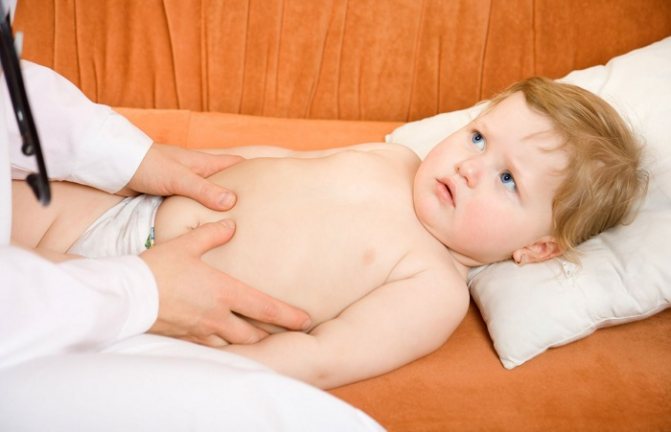
Causes of frequent farting in children
If a baby farts a lot, the reason for this may be various factors characteristic of a particular age of the child. The causes can be both natural and pathological, but the most common is an imbalance in the baby’s diet.
Factors that can cause frequent farting in a month-old baby include:
- Lack of enzymes necessary for normal digestion. Products, once in the gastrointestinal tract, begin to “ferment”, resulting in excessive gas formation.
- Swallowing air while feeding or crying.
- Consumption of low-quality or inappropriate mixtures.
- Incorrect preparation of the mixture.
- Binge eating.
- Dysbacteriosis. This condition is characterized by a lack of beneficial bacteria in the gastrointestinal tract.
- Lactase deficiency. Occurs when there is a lack of a special enzyme capable of digesting lactose (included in breast milk and infant formula).
- Allergy to cow's milk protein.
- Premature transfer to IV.
- Improper nutrition of a nursing mother during lactation (consumption of spicy foods, flour products, smoked meats and other foods that contribute to increased gas formation).
- Viral infections.
- Abnormal intestinal structure - peristalsis fails, the intensity of fermentation processes increases, as a result of which the baby constantly farts.
On a note. Frequent farting often occurs in children born prematurely and with signs of rickets and malnutrition.
The reasons why an older child often farts may be diseases of the digestive system (for example, colitis, gastritis). In addition, such a condition can be provoked by severe anxiety: under the influence of stress, intestinal tone increases, spasm occurs, as a result of which food moves through the gastrointestinal tract more slowly, strong fermentation and the release of gases occur.
On a note. If the baby farts often, but still feels well, then there is no reason to worry. Obviously, gases leave the intestines on their own without causing bloating or colic. By 4 months, the number of farts will decrease and the likelihood of colic will also decrease.
Intestinal colic
The reason that a child farts often may be intestinal colic. The baby, who spent 9 months in his mother’s belly, is accustomed to a different type of nutrition. The digestive system of a newborn turns out to be unprepared for new conditions and at first cannot cope with its task perfectly. Infants under 3-4 months do not have enough digestive enzymes capable of breaking down milk, so even breast milk is difficult for the baby to accept. Due to these features, newborn babies often suffer from intestinal colic.
On a note. Colic is a spasm, so the pain lasts for several minutes, then the child feels better, and after a while they make themselves felt again.
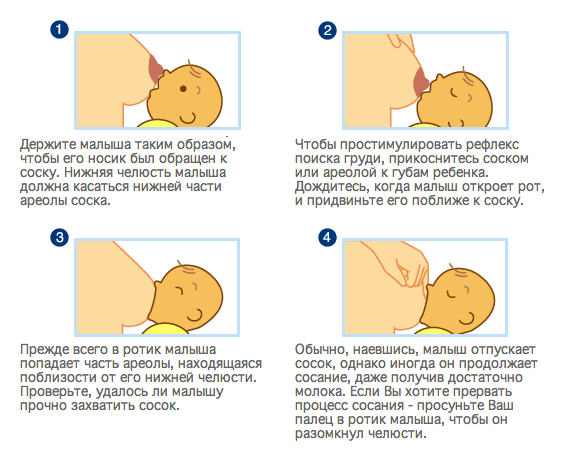
Improper attachment to the breast often leads to unpleasant symptoms in the newborn.
Flatulence
The fact that a child farts often is explained by the underdevelopment of the baby’s gastrointestinal tract, whose body has not yet had time to adapt to new conditions. In addition to the lack of enzymes, it is worth noting the underdevelopment of the microflora of the newborn. The fact is that in adults, the activity of bacteria that provoke fermentation is suppressed by the action of beneficial bacteria that make up the intestinal microflora. In an infant, it begins to form from the first days of life and only with time reaches sufficient development. Even fully formed microflora does not always guarantee the absence of flatulence, since for one reason or another there may be a lack of beneficial bacteria in the intestines.
The following circumstances lead to dysbacteriosis:
- Late breastfeeding (mother’s milk contributes to the development of the baby’s own microflora);
- Feeding with artificial formulas, improper preparation, inappropriate formula;
- Prematurity;
- Complicated childbirth;
- Food allergies;
- Infectious diseases;
- Intestinal disorders;
- Taking antibiotics.
Flatulence in a child can also be caused by:
- Incorrect feeding technique (the baby does not fully grasp the breast or bottle, as a result of which air enters the stomach along with food, which provokes bloating and regurgitation);
- Improper nutrition of a nursing mother (if she consumes large quantities of raw vegetables, sweets, flour, fatty and smoked foods, nuts).
Other Possible Causes
In addition to the above reasons, frequent farting in a baby can be caused by the following factors:
- Lactase deficiency;
- Constipation (usually bottle-fed children suffer from it);
- Incorrect complementary feeding (if it contains foods such as beans, peas, white cabbage, fresh vegetables and fruits in large quantities);
- Non-compliance with diet;
- Incorrect order of food consumption. For example, vegetables and fruits are digested faster than other, heavier foods. The latter will prevent light foods from passing through the intestines, and therefore the processes of fermentation and gas formation will begin.
Causes
Depending on the reasons for the formation of flatulence, the following types can be distinguished:
- Nutritional. Appears after eating food that causes increased gas formation during digestion. Products containing coarse fiber and provoking fermentation: brown bread, beef, legumes, onions, tomatoes, fresh milk, carbonated drinks, etc. If a child has a gastrointestinal form of food allergy, any food can serve as a source of flatulence. Sometimes flatulence is caused by overeating and poor diet.
- Dysbiotic. Occurs due to uncontrolled growth of the population of microorganisms in the intestines. It usually occurs in a one-year-old child, when the microflora regulation mechanisms are not yet so effective. In the colon, the processes of putrefaction and fermentation are activated, which causes excessive release of gases.
- Dynamic. It develops due to abnormalities in the structure and location of the lower intestine, as well as due to a violation of its motor functions. In addition, the reasons may include hormonal imbalances and consumption of large amounts of protein foods. As a result, the process of gas removal occurs more slowly than their formation.
- Degestive. Its cause is a dysfunction of food digestion. In babies under one year old, this can happen due to a poorly developed digestive system. In children over 5 years of age, it manifests itself as a result of diseases affecting the gastrointestinal tract, for example, chronic gastritis, colitis, pancreatitis, dysbacteriosis. Incompletely broken down products accumulate in the intestines and come into contact with microflora. As a result, excessive gas formation occurs.
- Psychogenic. Happens during stressful situations and emotional overstimulation. Under the influence of adrenaline, the blood vessels of the intestine narrow, which inhibits the excretion and absorption of gases.
Degestive flatulence in young children can develop due to decreased levels of the enzyme that digests lactose. This happens when a child is transferred to artificial feeding, as well as in a very premature baby due to hypotension of the intestines and anterior abdominal wall. The amount of carbohydrates increases, and when they interact with intestinal microorganisms, they provoke flatulence.
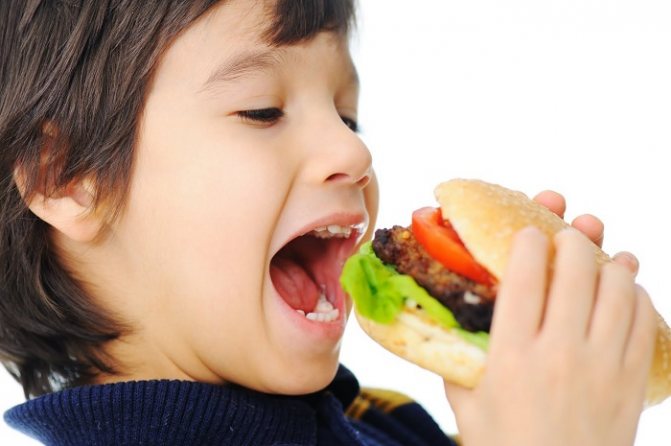
Preventative measures to prevent flatulence
To prevent excess gas formation in the baby’s body, the following measures can be taken:
- Monitor feeding technique.
- If the baby is on breastfeeding, the mother needs to follow a nutritional regime and adhere to the correct diet, drink more water.
- If the problem is lactase deficiency, the doctor will prescribe the baby an enzyme or switch the baby to a lactose-free formula.
- Give your child medications containing probiotics (this will improve the microflora).
- Add prebiotics to your baby's diet (promote the growth of beneficial bacteria).
- Monitor the amount of food your child consumes.
- Protect the baby from anxiety and stress (a newborn baby often passes gas if he is very frightened).
- Provide your child with an active lifestyle.
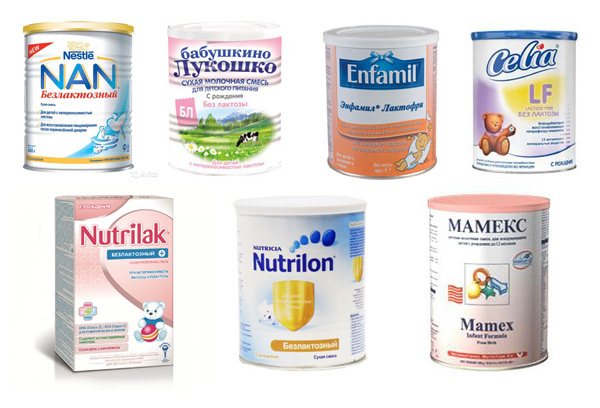
In case of lactase deficiency, babies are given a special (lactose-free) mixture
Frequent farting in a child is usually not a sign of a pathological condition. This phenomenon is quite natural for a child’s (especially an infant’s) body. However, if there are serious problems indicated by certain symptoms, you should consult a doctor.




